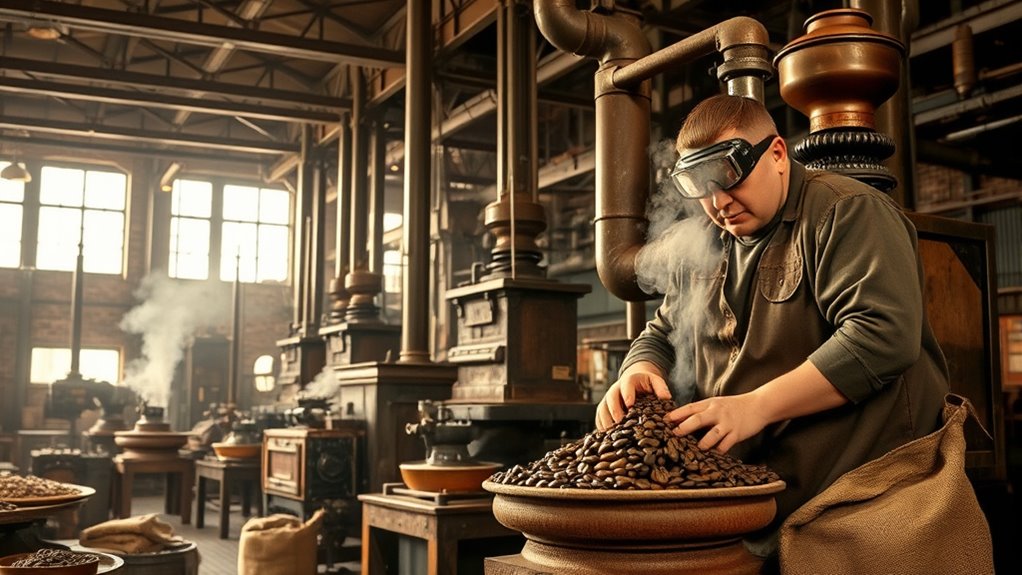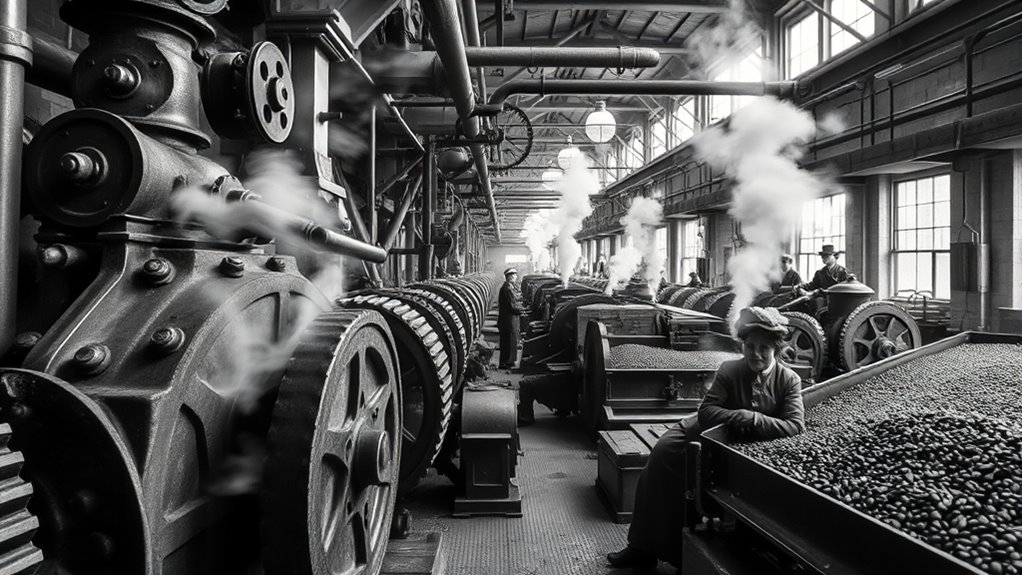During the Industrial Revolution, coffee became essential for workers, boosting their energy and helping them stay alert during long shifts. It improved discipline by replacing alcohol, supporting factory productivity. Coffeehouses fostered social and business connections, fueling urban growth and economic change. This caffeine-driven culture kept the pace of industry and city life moving fast. If you want to uncover how coffee shaped this transformative era even further, there’s much more to explore.
Key Takeaways
- Coffee provided essential caffeine to boost energy and alertness for factory workers during long industrial shifts.
- The shift from alcohol to coffee improved worker discipline and workplace efficiency in industrial settings.
- Coffee houses became hubs for social interaction, business discussions, and urban community building.
- Coffee fueled economic growth by supporting a disciplined workforce and facilitating industrial productivity.
- Coffee played a key role in urbanization, linking social, economic, and industrial development during the Industrial Revolution.

Have you ever wondered how coffee became an essential fuel for the Industrial Revolution? During this transformative period, the rise of industrialization drastically changed how people worked and lived. As factories multiplied and production shifted from homes to large-scale plants, there was a growing need to keep factory workers alert for long hours. Coffee consumption quickly became indispensable in meeting this demand. Its caffeine content offered a reliable way to boost energy and focus, helping workers stay productive during grueling 12- to 16-hour shifts.
Instead of traditional breaks, workers turned to coffee, which kept factories running around the clock and supported the rapid pace of industrial mass production.
Workers relied on coffee to sustain continuous factory operations and meet the demands of rapid industrial growth.
This shift from alcohol and beer to coffee played a significant role in improving worker discipline and focus. Coffee’s energizing effects reduced drunkenness and promoted sobriety in the workplace, making the industrial workforce more efficient. As factory owners realized the benefits, coffee became a staple in industrial settings, fueling economic growth.
Coffee houses, already popular social hubs in London and other cities, expanded their role as places where industrialists, merchants, and workers gathered to discuss ideas, exchange information, and coordinate business. These establishments helped foster urbanization by linking economic activity and social interaction, further accelerating the growth of cities like London.
In this era, coffee wasn’t just a beverage; it was a tool that supported a disciplined, efficient workforce. As urban centers expanded, so did coffee consumption, fueling a cycle of economic and social change. The rise of the industrial workforce depended heavily on caffeine to sustain the relentless pace of factory life.
This need for constant alertness contributed to widespread adoption of coffee, reinforcing its importance in the fabric of industrial society. Coffee houses also became critical arenas for fostering a sense of community among workers and entrepreneurs, which further spurred urban growth and economic development. The rise of industrialization increased the demand for energy sources like coffee to keep up with the rapid expansion of industries.
Frequently Asked Questions
How Did Coffee Affect the Industrial Revolution?
The current question explores how coffee influenced a major historical period. You should recognize that coffee boosted workers’ alertness, enabling longer shifts and more efficient production. It also fostered social and business interactions in coffeehouses, fueling ideas and innovations.
As demand grew, it expanded global trade networks. By understanding these impacts, you see how coffee played a key role in driving industrial progress and economic growth during this transformative era.
What Was the Connection Between Coffee and the Enlightenment?
You see, during the Enlightenment, coffee played a vital role by creating social spaces where thinkers could gather and exchange ideas. It encouraged rational discussion and sober debate, unlike alcohol-centered venues.
The stimulating effects of coffee helped these intellectuals stay focused and productive, fostering scientific and philosophical progress. As a result, coffee became a symbol of intellectual freedom and helped spread Enlightenment ideals across Europe.
How Did Coffee Play a Pivotal Role in the Scientific Revolution?
You see, coffee played a vital role in the scientific revolution by providing a stimulating environment for thinkers and scientists. It kept you alert during long discussions and experiments, encouraging rational debate and exchange of ideas.
Coffeehouses became hubs for collaboration, where you could challenge traditional beliefs, share discoveries, and advance scientific understanding. This caffeine-fueled setting fostered innovation and helped accelerate scientific progress during that transformative period.
What Did People Drink During the Industrial Revolution?
During the Industrial Revolution, you likely drank beer and ale to stay hydrated and energized because safe drinking water was scarce.
Coffee became a popular alternative, helping you stay alert during long factory hours, while tea offered warmth and mental focus.
Many people boiled water to make these drinks, reducing disease risk.
Beer was common at breakfast and throughout the day, especially in bustling cities like London.
Conclusion
As you can see, the Industrial Revolution transformed coffee from a simple beverage into a global phenomenon. It fueled workers’ energy, connected people across continents, and spurred economic growth. Without this revolution, coffee might not have become the bustling industry it is today. So, next time you enjoy your cup, remember how this powerful era shaped your daily routine, making coffee a symbol of progress and connection worldwide.









